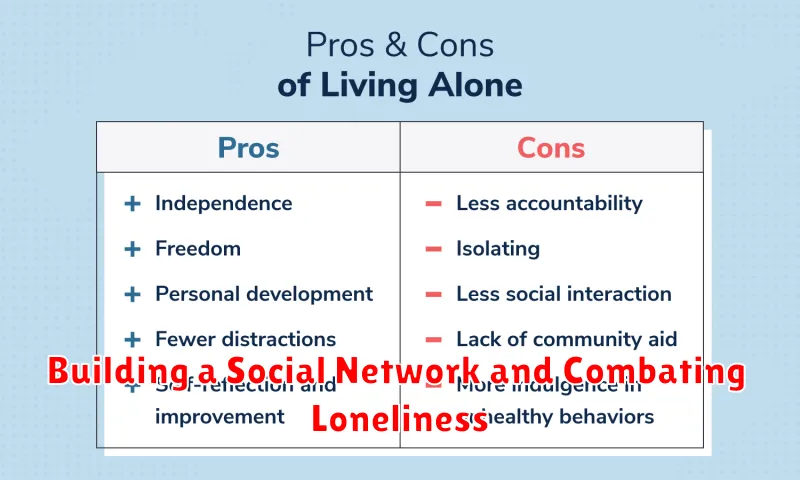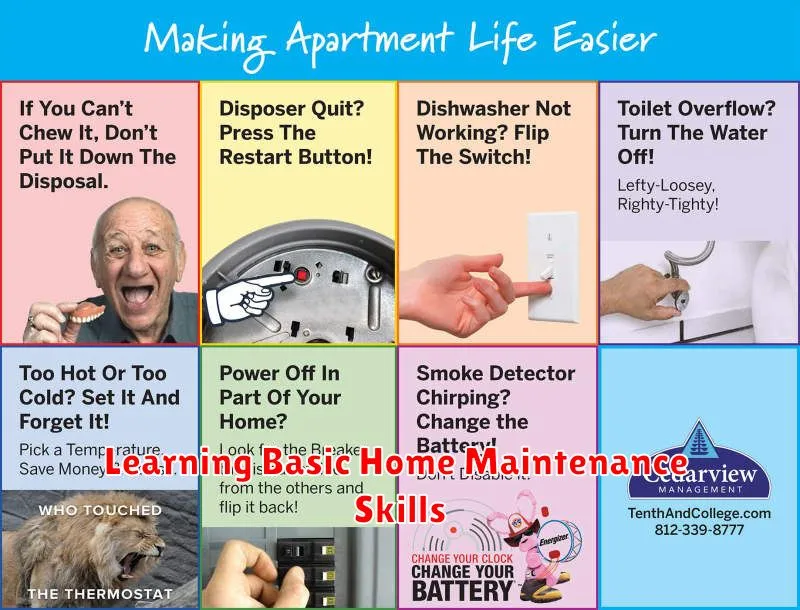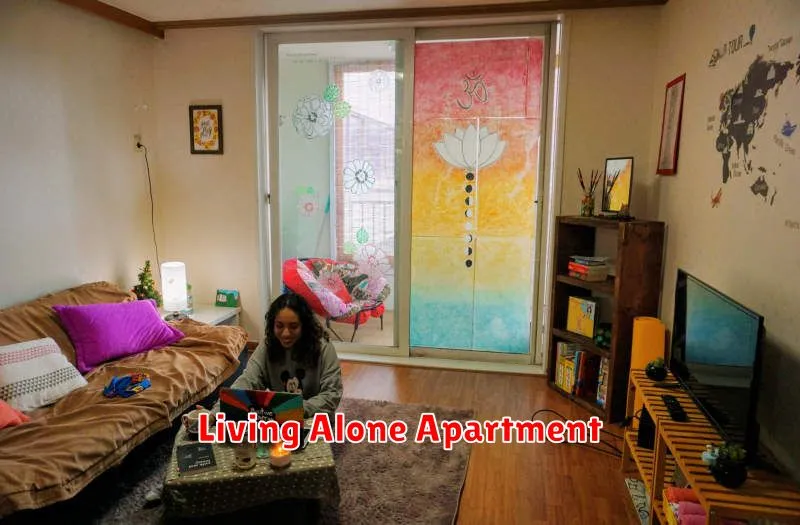Moving into your first apartment is an exciting milestone! It’s a chance to create your own space, personalize your decor, and experience the freedom of living independently. However, the transition can also feel daunting. From managing finances to handling household chores, there’s a lot to learn. But don’t worry! This guide is packed with practical tips for living alone in your first apartment, covering everything from budgeting to safety, helping you confidently navigate this new chapter in your life.
Creating a Budget and Managing Finances
Moving into your first apartment is a big step towards independence, but it also comes with the responsibility of managing your own finances. Creating a budget is crucial for staying on top of your expenses and avoiding financial stress.
Start by tracking your income and expenses for a month or two. Use a spreadsheet or budgeting app to categorize your spending, such as rent, utilities, groceries, transportation, and entertainment. This will give you a clear picture of where your money is going.
Once you understand your spending patterns, you can create a realistic budget. Allocate a specific amount for each category and try to stick to it. It’s helpful to set aside money for savings and unexpected expenses, too.
Consider using a budgeting method that works best for you, such as the 50/30/20 rule (50% for needs, 30% for wants, 20% for savings and debt repayment) or the zero-based budgeting approach (allocating every dollar of your income).
Regularly review your budget and make adjustments as needed. Be mindful of your spending habits and look for opportunities to save money. You can explore options like meal prepping, cutting back on entertainment, or finding cheaper alternatives for your needs.
Managing your finances wisely is key to enjoying your first apartment experience. By budgeting carefully and staying on track, you’ll be able to create a sustainable and enjoyable living situation.
Setting Up Utilities and Essential Services
One of the first things you’ll need to do after moving into your first apartment is set up essential utilities. This includes services like electricity, gas, water, internet, and garbage collection. It’s crucial to contact these providers before your move-in date to ensure that services are running smoothly when you arrive.
To get started, you’ll need to gather some information about your apartment, such as the address, the apartment number, and the previous tenant’s name (if available). This information will help you set up accounts and connect your utilities.
You may also need to provide your personal information, such as your name, social security number, and contact details.
Be sure to compare different providers and plans to find the most cost-effective options for your needs. Once you’ve chosen a provider, contact them directly to schedule an installation appointment if necessary. It’s a good idea to set up auto-pay or online bill payment to ensure timely payments and avoid late fees.
Furnishing Your Apartment on a Budget
Moving into your first apartment is exciting, but it can also be expensive. Furnishing your space can quickly drain your budget, but it’s possible to create a stylish and comfortable home without breaking the bank. Here are some tips for furnishing your apartment on a budget:
Shop secondhand. Thrift stores, consignment shops, and online marketplaces like Facebook Marketplace and Craigslist are great sources for affordable furniture. You can often find gently used pieces for a fraction of the price of new items.
Consider renting furniture. Renting furniture is a great option if you’re not sure what style you want or if you’ll be moving soon. You can rent everything from sofas and beds to dining tables and chairs.
DIY projects. Transforming old furniture or building your own pieces can be a fun and affordable way to add personality to your apartment. You can find plenty of DIY inspiration online and in home decor magazines.
Prioritize essential pieces. Focus on buying the essentials like a bed, a couch, and a dining table. You can always add other pieces later.
Shop sales and clearance items. Many furniture stores offer discounts on items that are being discontinued or that are in stock. Keep an eye out for sales and clearance events.
Get creative with decor. Use affordable decor items like plants, artwork, and throw pillows to add personality to your apartment. You can also create your own art or buy prints online.
Establishing a Cleaning Routine and Maintaining Order
Living alone for the first time can be exciting and overwhelming. It’s easy to get caught up in the freedom and independence and neglect basic chores. Creating a cleaning routine and maintaining order is crucial for a comfortable and healthy living space.
Start by breaking down your cleaning tasks into manageable chunks. You can create a daily, weekly, and monthly cleaning schedule. This will prevent the build-up of dirt and grime, making deep cleaning less overwhelming.
For example, you can make your bed daily, wipe down kitchen counters after each use, and do a quick vacuuming of high-traffic areas every day. Weekly tasks might include changing bedsheets, wiping down the bathroom, and cleaning the toilet. Monthly tasks could include deep cleaning the kitchen, bathroom, and vacuuming under furniture.
To keep your apartment organized, designate specific areas for your belongings. This might include having a designated spot for shoes by the door, a bookshelf for books, and a drawer for clothes. Using storage containers for items you don’t use regularly can also help to free up space and keep things organized.
Maintaining a cleaning routine and order may take some effort initially, but it will make your apartment a more comfortable and enjoyable space to live in. It will also prevent the build-up of dirt and grime, making your life easier in the long run.
Staying Safe and Secure While Living Alone
Moving into your first apartment is exciting, but it also comes with responsibilities, especially when you’re living alone. Safety and security should be top of mind. Here are some tips to help you feel safe and secure in your new home:
Know your neighbors. Introduce yourself to the people who live around you. This helps build a sense of community and can provide you with a network of support in case you need it.
Lock your doors and windows. This may seem obvious, but it’s easy to forget when you’re in a hurry. Make a habit of locking up whenever you leave your apartment, even if it’s just for a few minutes. Also, consider using a deadbolt lock for extra security.
Be mindful of your surroundings. Pay attention to who’s around you, especially when you’re walking to and from your apartment. If you feel uncomfortable, trust your instincts and go to a safe place.
Invest in a home security system. A security system can deter burglars and provide you with peace of mind. You can even get a system that allows you to monitor your home remotely.
Don’t leave valuable items in plain sight. Keep your valuables out of sight from windows or doors, and consider using a safe to store important documents and jewelry.
Be cautious about social media. Don’t post your location or personal details that could be used by criminals. It’s also a good idea to be careful about who you add as friends on social media.
Learn basic self-defense techniques. Knowing how to protect yourself can give you confidence and help you feel safer. There are many resources available online and in your community to help you learn self-defense.
Living alone can be both liberating and challenging. By taking some simple precautions, you can stay safe and secure in your new home and enjoy the independence of living on your own.
Building a Social Network and Combating Loneliness

Moving into your first apartment can be exciting, but it can also be isolating. Suddenly, you’re surrounded by four walls and a whole lot of space to fill. It’s easy to feel lonely and isolated when you’re living alone. But there are ways to build a social network and combat loneliness, even if you’re new to the city or town.
One of the best ways to meet people is to get involved in your community. Join a local gym, take a class at a community center, or volunteer at a local organization. You can also join a book club, a sports team, or a hobby group. These activities will give you the chance to meet people with similar interests.
Another great way to meet people is to strike up conversations with your neighbors. Say hello when you see them, offer to help them carry groceries, or invite them over for a coffee. Building relationships with your neighbors can be a great way to feel connected to your community and combat loneliness.
Finally, don’t forget the power of technology. Social media can be a great way to stay connected with friends and family, and there are even apps specifically designed to help people meet new people. So, don’t be afraid to download a few dating apps or join a group for singles in your city. You might be surprised at how many people are also looking to connect with others.
Developing Healthy Habits and Routines

Moving into your first apartment is exciting, but it also comes with the responsibility of establishing healthy habits and routines. This is your chance to design a lifestyle that supports your well-being. Start by creating a structured schedule that includes time for work, study, exercise, meals, and relaxation. This helps you manage your time effectively and avoid feeling overwhelmed.
Another crucial habit is meal planning and prepping. It’s easy to fall into the trap of unhealthy takeout or instant meals when you’re busy. Instead, take time on weekends to plan your meals for the week and prepare ingredients in advance. This saves time and money, and ensures you’re eating nutritious food.
Don’t neglect your physical health. Even if you’re short on time, find ways to incorporate exercise into your routine. Join a gym, take walks in your neighborhood, or try online fitness classes. Regular physical activity is vital for both your physical and mental well-being.
Living alone can be isolating, so it’s important to cultivate social connections. Make an effort to reach out to friends and family regularly. Consider joining clubs, attending local events, or volunteering to meet new people. This helps combat loneliness and provides a sense of community.
Finally, remember to prioritize self-care. Set aside time each day for activities you enjoy, such as reading, listening to music, or spending time in nature. This helps you de-stress and recharge. Living alone doesn’t mean you have to be alone all the time. Embrace the opportunity to create a life that nourishes both your mind and body.
Learning Basic Home Maintenance Skills

As exciting as moving into your first apartment is, it’s also a good time to learn some basic home maintenance skills. These skills will help you save money, keep your apartment in good condition, and feel more confident in your ability to handle minor repairs.
Here are a few key skills to start with:
- Unclogging drains: This is a common problem that can be easily fixed with a plunger. You can also try using baking soda and vinegar to dissolve the clog.
- Changing light bulbs: This is a simple task that you should be able to do yourself. Make sure you know what type of bulb your fixtures use.
- Fixing a leaky faucet: This can be a more challenging task, but there are plenty of online resources and YouTube videos that can walk you through the steps.
- Replacing a toilet flapper: This is a common issue that can be easily fixed by replacing the flapper, which is the rubber piece that helps control the flow of water.
- Basic carpentry: Knowing how to hammer a nail, screw in a screw, and fix a loose handle is essential for any homeowner.
There are many ways to learn these skills, including:
- Watching YouTube videos: There are tons of helpful tutorials available online.
- Reading books and articles: Many resources are available at your local library or bookstore.
- Taking a class: You can often find classes at community centers or online.
- Asking for help from a friend or family member: If you know someone who is handy, don’t be afraid to ask for their help or advice.
Learning basic home maintenance skills will help you save money, keep your apartment in good condition, and feel more confident in your ability to handle minor repairs. And who knows, you might even discover a hidden talent for fixing things!
Making the Most of Your Solo Living Experience
Moving into your first apartment is a big step towards independence. It’s an exciting time, full of possibilities and new adventures. Living alone offers a unique opportunity to create a space that reflects your personal style and caters to your individual needs. It’s a chance to develop self-reliance, learn valuable life skills, and embrace the freedom that comes with being your own landlord.
To make the most of your solo living experience, consider these tips:
1. Establish a Routine: Living alone can lead to unstructured days. Setting a daily routine will help you stay organized, manage your time effectively, and maintain a sense of balance. This might include a specific wake-up time, dedicated work or study hours, and regular exercise.
2. Prioritize Self-Care: It’s easy to get caught up in the day-to-day tasks of apartment living. Make time for activities that nourish your mind, body, and soul. Whether it’s reading a book, taking a relaxing bath, or pursuing a hobby, prioritizing self-care will help you recharge and maintain your well-being.
3. Embrace Social Connections: While living alone offers privacy and solitude, it’s essential to maintain social connections. Reach out to friends and family, join local clubs or groups that align with your interests, and engage in activities that foster meaningful relationships.
4. Create a Cozy and Functional Space: Your apartment is your sanctuary, so make it a place you love spending time in. Personalize your space with decor that reflects your personality and interests. Organize your belongings to create a clutter-free and functional environment.
5. Learn Basic Maintenance Skills: Living alone means you’re responsible for handling basic maintenance tasks. Take the time to learn how to fix a leaky faucet, change a lightbulb, or unclog a drain. Having these skills will save you time and money in the long run.
6. Enjoy the Freedom: One of the greatest benefits of living alone is the freedom to do what you want, when you want. Embrace the flexibility, explore your interests, and enjoy the independence that comes with being your own master.
Dealing with Unexpected Challenges and Emergencies
Living alone for the first time can be exciting, but it also comes with its share of unexpected challenges and emergencies. Being prepared for these situations can make a world of difference in how you handle them. It’s essential to have a plan in place for common issues like power outages, plumbing problems, or even a medical emergency.
Keep a Basic First Aid Kit: Stock your apartment with a basic first aid kit that includes bandages, antiseptic wipes, pain relievers, and other essentials. Knowing how to use these supplies can be a lifesaver in case of minor injuries.
Learn Basic Maintenance: While you might not be a handyman, learning basic maintenance skills like changing a light bulb, unclogging a drain, or fixing a leaky faucet can help you handle minor issues before they become bigger problems.
Emergency Contact List: Keep a list of important emergency numbers handy, including your landlord, neighbors, local plumber, electrician, and, of course, 911.
Prepare for Power Outages: Keep a flashlight, battery-powered radio, and extra batteries on hand. If you live in an area prone to power outages, consider investing in a generator.
Don’t Be Afraid to Ask for Help: Living alone doesn’t mean you have to handle everything on your own. If you’re facing a situation you can’t manage, reach out to your landlord, neighbors, or friends for assistance.
By being prepared and taking these steps, you can navigate unexpected challenges and emergencies with confidence, making your first apartment living experience a smooth and enjoyable one.

